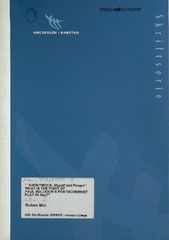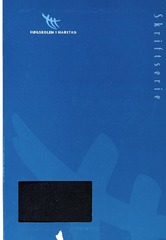Blar i forfatter "Moi, Ruben"
-
Amnesi på Ordkalotten
Moi, Ruben (Chronicle; Kronikk, 2013)Hva husker vi? Hvordan vet vi at minnet er riktig og autentisk? Hvem husker det som er glemt? Minnet, hukommelsen og glemselen er begreper som er sammensatte og underfundige. Prosesser knyttet til disse begrepene er komplekse. Ordkalotten, Tromsøs internasjonale litteraturfestival, utforsker disse prosessene denne uka under headingen Amnesi. -
' 'Anonymous: Myself and Pangur': What is the point of Paul Muldoon's postmodernist play in Hay?'
Moi, Ruben (Research report; Forskningsrapport, 2000) -
Borders and boundaries in Northern Ireland and the poetry of Seamus Heaney
Moi, Ruben (Journal article; Tidsskriftartikkel; Peer reviewed, 2014) -
Imagining Northern Norway: Visual configurations of the North in the art of Kaare Espolin Johnson and Bjarne Holst.
Moi, Ruben (Journal article; Tidsskriftartikkel; Peer reviewed, 2016)The formative processes of collective identity and belonging inspired Benedict Anderson to write his ground-breaking Imagined Communities (1983). His emphasis on imagination and sodality in these processes also resonates in contemporary artistic presentations of life in northern Norway. A rereading of Anderson’s thesis in relation to the arts in northern Norway, in particular the visual arts, ... -
Konferanserapport fra 'Helsedagene i Nord-Norge', 1996
Nordahl-Pedersen, Hilde; Moi, Ruben (Research report; Forskningsrapport, 1997) -
Literature and Data-driven Learning
Krogh, Ida Margrethe Rask; Moi, Ruben (Journal article; Tidsskriftartikkel; Peer reviewed, 2023-03-23)This article aims to examine how and why we can use digital storytelling (DST) to teach literature in the upper secondary classroom, and makes use of Mark Haddon’s complex, multimodal novel The Curious Incident of the Dog in the Night-Time (2004) as an example. DST is a powerful tool for the 21st century classroom, with the potential to help pupils to become empathetic, creative, inquisitive ... -
Maggots and Language in Paul Muldoon's Maggot
Moi, Ruben (Chapter; Bokkapittel, 2020-01-13)‘Like the whorl of an out-of-this-world ear…,’ (74) run the first words of the one-sentence, four-stanza sign-centered sonnet ‘@.’ The most fluorescent language poem in Maggot appears as a very apposite sign of what can be termed Muldoonian ‘p@stmodernism.’ The term signals mainly post-Madoc poems in Muldoon’s poetry, from e.g. ‘Crossing the Line’ and ‘The Plot’ to several in this volume, which ... -
Pangur Bán, Translation, Postmodernism, Paul Muldoon
Moi, Ruben (Journal article; Tidsskriftartikkel; Peer reviewed, 2022-06-22)«Pangur Bán» is probably the best know poem in Celtic studies, and a poem that tends to become increasingly more popular to audiences outside of Ireland. However, the anonymous, medieval poem has been cherished throughout history for a wide range of poetic, philosophical, intellectual and educational reasons. To inquire into the longevity and popularity of a marginal gloss on his cat by an Irish ... -
Paul Muldoon and the Language of Poetry
Moi, Ruben (Book; Bok, 2020)Paul Muldoon and the Language of Poetry is the first book in years that attends to the entire oeuvre of the Irish-American poet, critic, lyricist, dramatist and Princeton professor from his debut with New Weather in 1973 up to his very recent publications. Ruben Moi’s book explores, in correspondence with language philosophy and critical debate, how Muldoon’s ingenious language and inventive form ... -
The politics of Harold Pinter's plays
Moi, Ruben (Journal article; Tidsskriftartikkel, 2006) -
"Second time round": Recent Northern Irish history in For all we know and Ciaran Carson's Written arts
Moi, Ruben; Larsen, Annelise Brox (Journal article; Tidsskriftartikkel; Peer reviewed, 2014-09-20)This paper analyses how Ciaran Carson’s For All We Know (2008) adds to other disciplinary approaches to the challenges of re-presenting the past. The representation of history is a controversial field, as much of the radical tradition of history debates in Marx, Derrida, Foucault and Kristeva indicates. Controversies over history are also prevalent in Belfast and Northern Ireland where history ...


 English
English norsk
norsk









